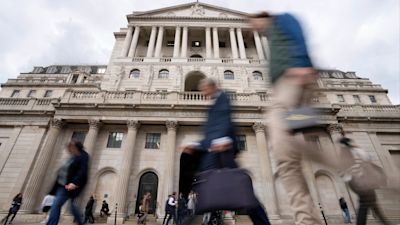Bank of England unveils highest interest rate rise since 1980s

ITV News reporter Sarah Corker hears from a dad worried about his rising mortgage repayments, and a tenant whose landlord has hiked his rent
The Bank of England has unveiled a 0.75% interest rate rise - the biggest since the 1980s - in a bid to control the runaway inflation.
It sees the Bank’s base interest rate rise from 2.25% to 3%, the highest since 2008.
The decision was made by the nine members of the Monetary Policy Committee (MPC) and is the single biggest increase in interest rates since 1989.
ITV News business and economics editor Joel Hills explains what the interest rates hike means for you
All but two members of the MPC voted to push up interest rates by 0.75 percentage points. One member voted for a 0.5 percentage point increase, while another wanted a much softer 0.25 percentage point rise.
The Bank of England says further interest rate hikes - possibly reaching 5.2% - could be required to pull inflation back to its 2% target.
Today's rise is the eighth time in a row that the Bank of England has increased interest rates.
The Bank has warned the UK could be facing the longest period of recession since reliable records began. ITV News' Political Editor, Robert Peston, has described it as "really grim news".
Bank of England governor Andrew Bailey acknowledged the eight rate rises since last December are "big changes and they have a real impact on peoples' lives".
Mr Bailey said: "If we do not act forcefully now, it would be worse later on."
The interest rate rise will add around £3,000 per year on to mortgage bills for those households that are set to renew their mortgages, the Bank said.
That is a further expense on top of rising energy bills, food prices and overall cost of living.
Savills Estate Agents predicts the average house price will be more than £22,000 higher in five years time, than it is now. That is despite property values being expected to fall by 10% in 2023.
The estate agent's assume house prices will start to recover from 2024 as interest rates and affordability pressures ease, after the expected fall next year.
This time last year the base rate stood at just 0.1%.
The base rate fell to 0.1% on 19 March 2020 from 0.25% - a rate it had dropped to on 11 March 2020.
Up until this point the rate had been at 0.75% since 2018.
The interest rate rise comes ahead of the chancellor's fiscal statement - which is expected on 17 November - after it was postponed from the previously planned date of 31 October.
Jeremy Hunt says "the most important thing the British government can do right now is to restore stability, sort out our public finances, and get debt falling so that interest rate rises are kept as low as possible" but he admitted "there are no easy options".
Leader of the Labour Party, Sir Keir Starmer, says the interest rate increase will make people's financial positions "much, much harder".
Meanwhile Shadow chancellor Rachel Reeves told the Prime Minister to "face up to his mistakes" that have led to the "vicious cycle of stagnation" after the Bank of England issued a stark inflation warning.
"Families now face higher mortgages and more anxiety after months of economic chaos."
Earlier this month, markets had predicted the interest rate increase could be as much as one percentage point but sentiment has calmed somewhat after the change of Chancellor and Prime Minister and Bank of England bond purchases pushed down on the cost of borrowing.Markets have also witnessed a decreased appetite for large hikes globally.
The US Federal Reserve increased rates by another 0.75 percentage points on Wednesday, but signalled that while further increases were likely to rein in inflation, they may be smaller and it could slow the pace of future rises.
The Bank of Canada also recently increased its interest rate by 0.5 percentage points, below the 0.75 percentage point rise which had been widely predicted.
Want a quick and expert briefing on the biggest news stories? Listen to our latest podcasts to find out What You Need To Know